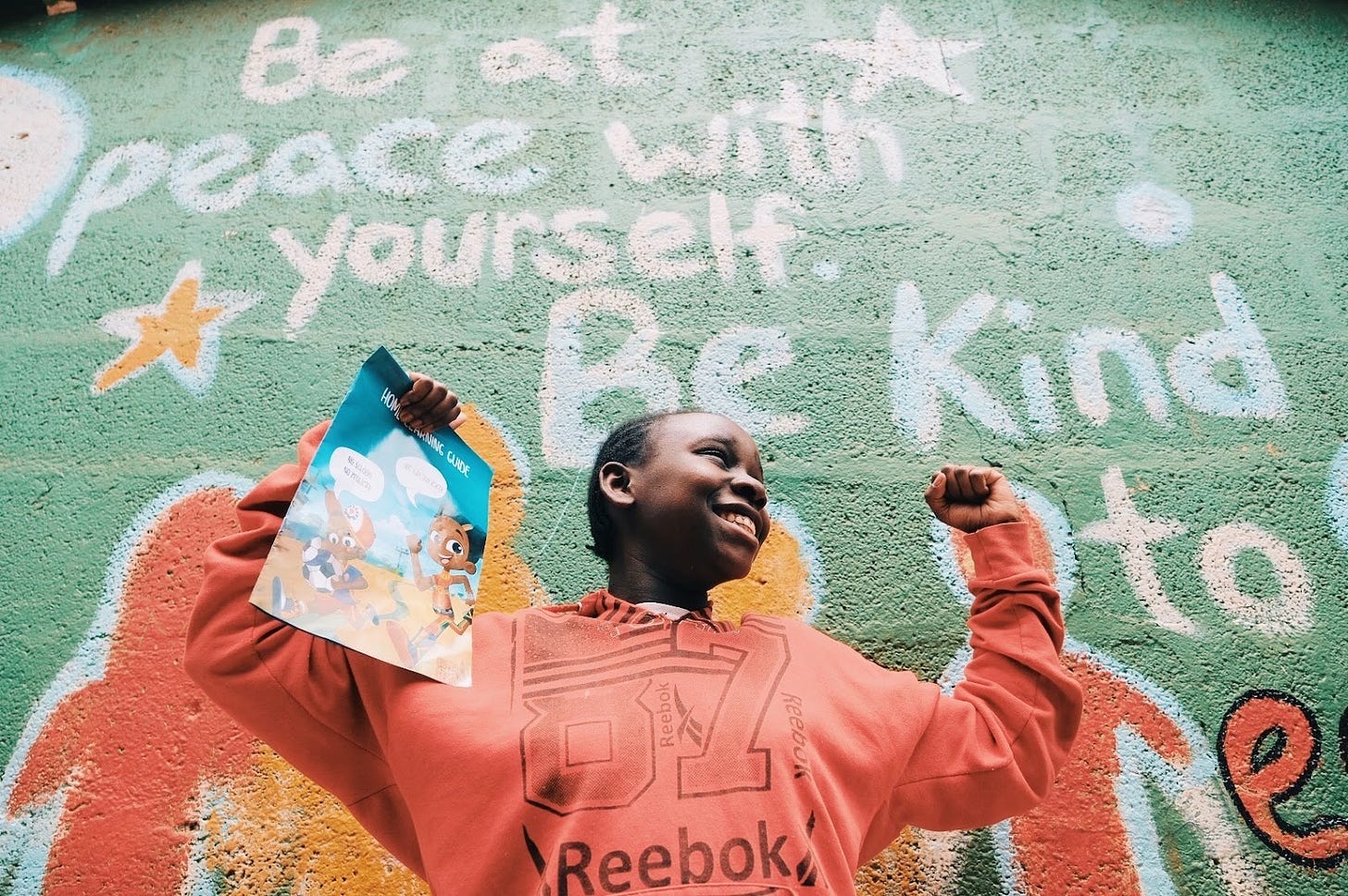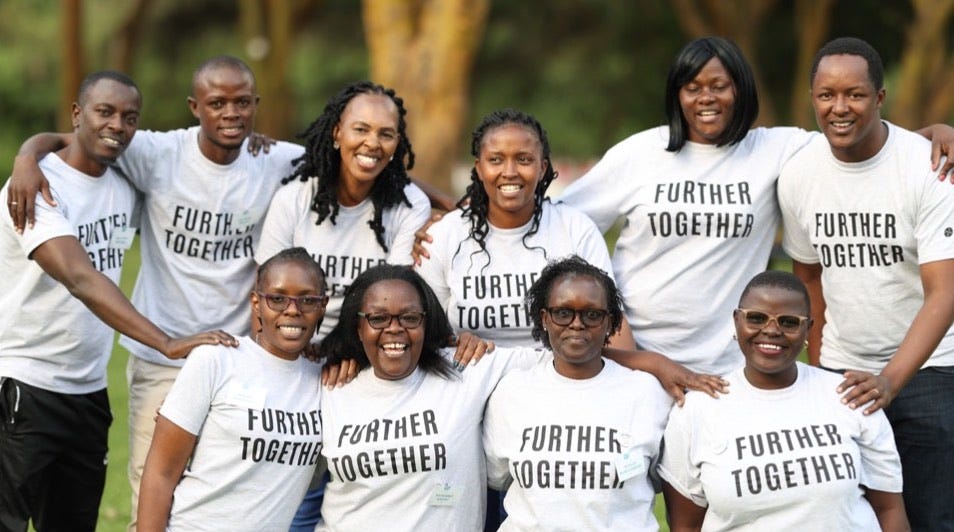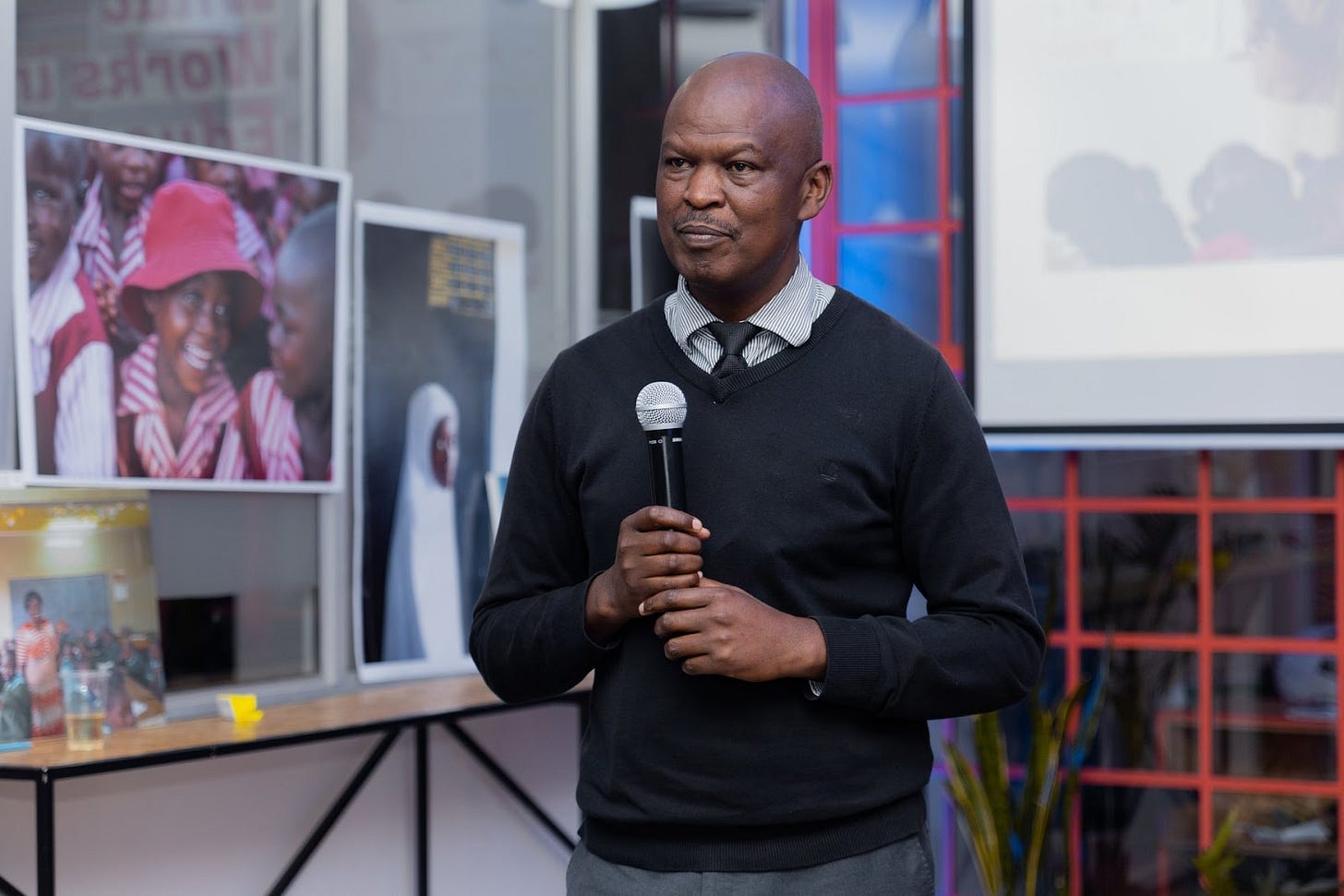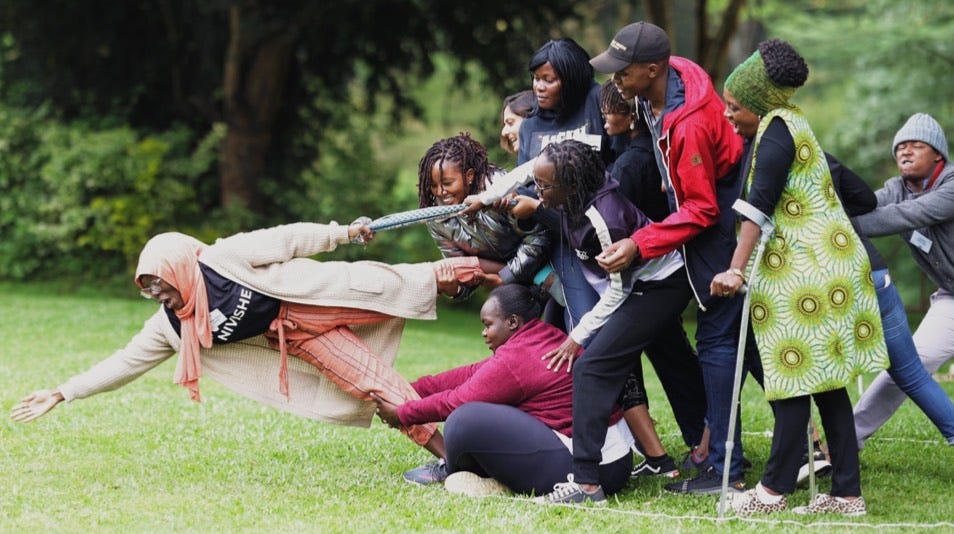🧩 5 Ways to Connect Proximate Leaders for Collective Impact
What we learned from 5 years and 130 Metis Fellows.
This article was originally published at the New Education Story - News & Resources as a part of the Global Insight Series on Transforming Education.
“If you want to go fast, go alone. If you want to go far, go together.” We launched Metis in 2017 based on this premise. Metis equips proximate leaders and entrepreneurs to transform Kenya’s education system - so that Kenya is a lighthouse for African education systems. In five years with 130 Fellows, we have learned a lot about what it takes to foster collective impact. We hope these five strategies will be useful for anyone trying to coordinate a group of actors to transform a system.

1. Communities of practice across silos build TRUST and confidence for system changers.
Knowledge is costly. It can take many years and significant funds for leaders to hone their learning model and develop the structures to execute it well. But if we build together, we can grow systems change smarter, faster, and stronger. If we share what we know, open source our tools, and invest in the health of networks, we can decrease the cost of innovation.
Metis Fellows participate in a retreat and monthly community of practice (COP), where they go on learning site visits, share challenges, and advise each other on solutions. COPs bring together leaders who usually work in silos without interacting: government school principals and private school founders (across ECD, primary, secondary, TVET), policymakers from federal and county agencies, nonprofit executives, venture-backed edtech CEO’s - across all 47 Kenyan counties, urban informal settlements, wealthy neighborhoods, refugee camps, and marginalized communities (homeless youth, rural semi-nomadic groups, and sexual assault survivors). Bringing these leaders together in one room allows them to build strong relationships, which makes them more likely to reach out to one another when they need help.

As a result, innovations scale across private, non-profit, and government institutions. For example, Fellow Ruth Mugambi, the Director of Secondary Education at Kenya’s curriculum agency, was influenced by Metis Fellows at Dignitas and Big Picture Learning, and by her Metis mentor at STIR in India. She incorporated their approach of professional learning communities into national policy documents for teacher professional development, which will be rolled out across the country. Because of a powerful network, an evidence-based innovation spearheaded by nonprofits will now reach over 100,000 Kenyan government teachers.
There are countless other examples of collaboration between Fellows across silos:
Maria Omare invited Dr. Maina WaGioko (a finalist for the 2018 World Teacher Prize) to become a board member for her organization, which connects children with disabilities to a stronger education.
Bookbunk and ChezaCheza collaborated to offer dance-based socio-emotional learning programs at Kenyan public libraries.
Fellows Rukia Sebit and Janet Mwitiki collaborated to launch a library in Kibera.
Dr. Utheri Kanayo-Kiragu joined the first cohort with a dream to start a school, but no plan. Mentors and Fellows in the Metis community shared full curriculums, tips on launching a school, notes on government compliance and training teachers, connections to funders, and support when the entrepreneurial journey inevitably got rocky. Utheri launched Children in Freedom School, the first Afrocentric school in Kenya, which now serves 300 learners in Nakuru.

2. ACTION-ORIENTED events create learning, co-creation, and networking for powerful impact.
In addition to spaces within a closed group, creating events that tap into a larger network is critical. Whereas in many events the audience passively listens to speakers or panels, Metis events - such as our ReimaginED annual conference - focus on active participation through activities such as site visits, co-creation workshops, facilitated networking games, exhibitions, or short exposure to a concept with time to practice and apply the skill. Our events covered topics such as gender equity, climate change education, art-based learning, mental health for learners, teacher training, and fundraising skills - with partners such as Imaginable Futures, For Impact, Girl Rising Global Education Fund, and Segal Family Foundation.

Running more action-oriented events doesn’t have to be expensive or complicated. You can leverage other gatherings where key people will be concentrated, use events for multiple purposes, and leverage existing spaces. For example, for every Fellows cohort, we have a Finalist Day, where we evaluate and select potential Fellows and also facilitate time for finalists to meet one another and share knowledge. We also co-hosted an event with East Africa Philanthropy Network at an exclusive members-only club in Nairobi. In our first year, we ran our own physical co-working space for education organizations, where we had large networking events and organic interactions (with our space members from Kukua, M-Shule, and Wangari Maathai Foundation). These kinds of events have a huge payoff, even if it is hard to quantify. They brought proximate leaders into the same room as leaders from powerful organizations like the World Bank and the Gates Foundation.
In addition to running your own events, your organization can connect your leaders to share their work at events run by others. For example, Fellow Jeffrey Okoro leads the Best Schools Initiative at the nonprofit Carolina for Kibera, in the community where he grew up; they collect data about schools’ progress and growth areas, share evidence and best practices with school leaders, and use this data to see an overall picture of how the education system in Kibera is improving over time. Metis connected Jeffrey with the opportunity to present in a co-creation workshop at the 2019 ALforEd conference, where heard advice from funders and edupreneurs from across Africa. He also created partnerships for CFK with Fellows from Wangari Maathai Foundation, edtech startup M-Shule, and Sunflower Trust (which educates girls in informal settlements).
3. Orchestrators can respond quickly to facilitate COLLECTIVE ACTION when urgent needs arise.
When the pandemic hit Kenya, Metis leaders were able to quickly collaborate and mobilize shared resources because of pre-existing relationships of trust. While schools were closed for nine months, Metis partnered with Edtech East Africa, Arifu, and others to co-create Keep Kenya Learning - an effort to design and deliver home learning guides for children and parents. Metis ran virtual workshops to train parents and Metis Fellows delivered guides to 135,000 learners across Kenya; Jeffrey Okoro’s team alone distributed guides to 11,000 learners in Kibera. The guides were used in 7 countries and translated into 6 languages - including Hausa and Thai!

In a time of crisis, trust was the accelerator that enabled mass distribution of food and learning resources, MOUs enabling high-quality programming on public television, and quick shifts to distance learning. Funders and organizations must make up-front investment in building the trust within an ecosystem - it will pay dividends when it matters most. And leaders will invest in this too; all Metis Fellows pay to join the program (on a need-based sliding scale).

4. Introductions amplify proximate leaders to access funding, POWER, and influence.
It may seem obvious, but we found that it needs to be explicitly stated: one of your organization’s biggest assets is your capacity to make introductions between people across your network. This takes very little time, but it can create huge results.

Fellow Franco Odhiambo embodies the power of this process. He grew up in Kibera and co-founded ChezaCheza Foundation to teach socio-emotional learning through dance in informal settlements. After Metis recommended him to facilitate at the ALforEd conference in Nairobi, he was hired to facilitate his dance-based education approach at another conference in Ghana - his first-ever flight outside of Kenya. There, he met the CEO of Mastercard Foundation, which created a documentary about his work. Through Metis Fellows, he secured partnerships with over 25 schools, created a revenue stream for his organization, and accessed introductions to multiple foundations that funded ChezaCheza, such as LEGO Foundation. Metis has connected over 30 Fellows to receive grants for their work, including $200,000 from Roddenberry Foundation.

Metis has amplified the voices of countless others. Debborah Odenyi was a Principal at SHOFCO’s school for girls in Kibera when she was a Fellow. When the Girl Rising Global Education Fund team was hiring, Metis recommended her for the job, and she now leads their work supporting girls’ education across Kenya. Metis also recommended two Fellows for funding from the same organization (Carol Owala and Rukia Sebit); both were chosen to receive grants and technical support. Metis recommended Fellow Maria Omare to be profiled by BRIGHT Magazine; after becoming a Metis Fellow, her organization received funding from Segal Family Foundation, the African Visionary Fund, and other high-profile opportunities. Metis also recommended multiple Fellows to speak at Mastercard Foundation events that reach thousands. When Esther Gacicio was a Fellow, she worked at the government of Kenya’s curriculum agency; she is now a consultant in the Edtech Hub Expert Pool, supporting governments across the world to implement evidence-based solutions.
5. These methods teach leaders SKILLS for how to lead collective impact themselves.
We have seen a ripple effect. When leaders participate in collective action, they learn how to do it and are equipped to lead it in other spaces - bringing together a group of actors to achieve more than any one organization could alone.

For example, Victor Odhiambo ran a co-creation forum with stakeholders that included seven government officials from the federal and county agencies for youth, health, and gender. Many Fellows participated in a Fellow-founded event in Laikipia where 77 organizations exhibited their models for youth-led action. Fellow Joy Nafungo went from leading an ECD center in an informal settlement, to UNICEF, to now managing the GPE Knowledge and Innovation Exchange, where she leads a collaborative of 17 organizations to support ECD evidence uptake across 11 countries.

Since 2015, Maria Omare’s the Action Foundation has ensured that 2,200 children and youth with disabilities in Nairobi’s informal settlements have the wrap-around support they need to thrive. During her Metis Fellowship, we saw Maria grow from a small two-bedroom office in Kibera to a three-story community hub. After meeting through Metis, Fellows Maria, Eric Nyamwaro from STEM Impact Center, and Sheilah Luttah from Kenya’s Ministry of Education (Special Education Directorate) planned a cross-sector approach to STEM education reaching 2,650 girls with disabilities. They crafted a winning proposal for Google.org, earning them over 700,000 USD to implement it in all of Kenya’s eight regions. This is just one example of how collaboration and collective action can strengthen everyone’s work to ensure that all children access the education they need to thrive.
Rebecca Crook is a Co-Founder and Executive Director of Metis, and Kat Pattillo is a Co-Founder and Board Member. Rebecca previously served as a Founding Principal for SPARK Schools in South Africa, Program Director for Dignitas in Kenya, and bilingual Teach for America Fellow in the US; she also shares stories of educators and learners as a Co-Founder of Everyday Education and through @stickylittleleaves. Kat is a consultant who conducts research and advises new capacity-building programs for education leaders (such as the Lemann Center in Brazil) and she taught at African Leadership Academy in South Africa; she also writes the EdWell newsletter and is writing a book about leaders transforming education systems across the Global South.







Love this article. Thoughtful and hopeful- full of great lessons. So honored to have worked and supported METIS